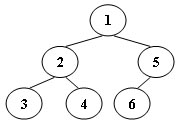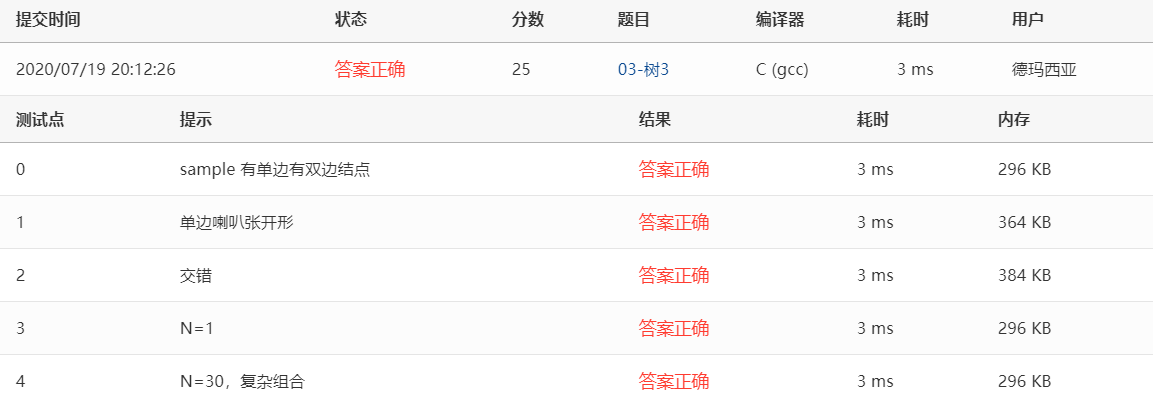03-树3 Tree Traversals Again (25分)
An inorder binary tree traversal can be implemented in a non-recursive way with a stack. For example, suppose that when a 6-node binary tree (with the keys numbered from 1 to 6) is traversed, the stack operations are: push(1); push(2); push(3); pop(); pop(); push(4); pop(); pop(); push(5); push(6); pop(); pop(). Then a unique binary tree (shown in Figure 1) can be generated from this sequence of operations. Your task is to give the postorder traversal sequence of this tree.

Figure 1
Input Specification:
Each input file contains one test case.For each case, the first line contains a positive integer N (≤) which is the total number of nodes in a tree (and hence the nodes are numbered from 1 to N). Then 2 lines follow, each describes a stack operation in the format: "Push X" where X is the index of the node being pushed onto the stack; or "Pop" meaning to pop one node from the stack.
Output Specification:
For each test case, print the postorder traversal sequence of the corresponding tree in one line. A solution is guaranteed to exist. All the numbers must be separated by exactly one space, and there must be no extra space at the end of the line.
Sample Input:
6 Push 1 Push 2 Push 3 Pop Pop Push 4 Pop Pop Push 5 Push 6 Pop Pop
Sample Output:
3 4 2 6 5 1
提测代码:
#include <stdio.h> #include <stdlib.h> #include <string.h> #define ERROR -1 #define Null -1; typedef int ElemType; typedef int Position; typedef struct SNode* Stack; struct SNode { ElemType* pData; Position top; Position maxSize; }; Stack CreateStack(int maxSize) { Stack S = (Stack)malloc(sizeof(int)); S->pData = (ElemType*)malloc(sizeof(int)*maxSize); S->top = -1; S->maxSize = maxSize; return S; } int IsFull(Stack S) { return (S->top == S->maxSize); } int Push(Stack S, ElemType data) { if (IsFull(S)) { return 0; } S->pData[++(S->top)] = data; return 1; } int IsEmpty(Stack S) { return (S->top == -1); } ElemType Pop(Stack S) { if (IsEmpty(S)) { return ERROR; } return S->pData[(S->top)--]; } void PostFromInAndPre(int pre[], int in[], int post[],int root, int left, int right) { static int counter = 0; if (left > right) { return; } ElemType data = pre[root]; int i = left; while (i < right && in[i] != data) ++i; PostFromInAndPre(pre, in, post, root + 1, left, i - 1); PostFromInAndPre(pre, in, post, root + 1 + i - left, i + 1, right); post[counter++] = data; } void PrintfTraversal(int tree[], int N) { if (N == 0) { return; } printf("%d", tree[0]); for (int i = 1; i < N; ++i) { printf(" %d", tree[i]); } } int main() { int N; scanf("%d", &N); Stack origin = CreateStack(N); int *pre = (int*)malloc(sizeof(int)*N); int *in = (int*)malloc(sizeof(int)*N); int *post = (int*)malloc(sizeof(int)*N); char strOperation[5]; int data; int preCounter = 0; int inCounter = 0; for(int i = 0; i < N*2; ++i) { scanf("%s", strOperation); if (strcmp(("Push"), strOperation) == 0) { scanf("%d", &data); Push(origin, data); pre[preCounter++] = data; } else { ElemType data = Pop(origin); in[inCounter++] = data; } } PostFromInAndPre(pre, in, post,0, 0, N - 1); PrintfTraversal(post, N); return 0; }
提测结果:
